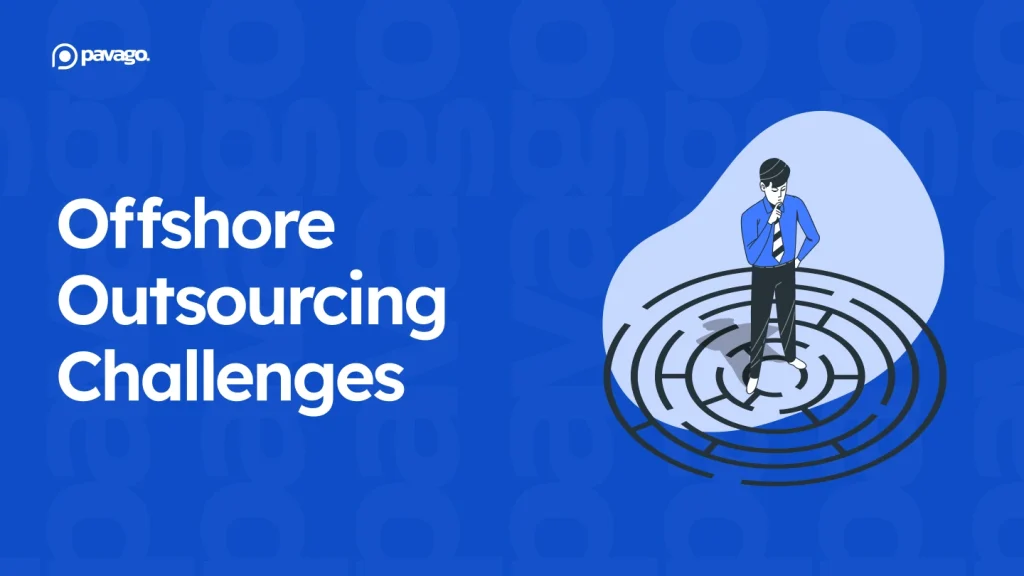Offshoring looks amazing on paper. You get access to highly skilled talent from around the world, often at a fraction of the cost of local hires. For SMBs trying to scale lean, that can be a game-changer.
But then the doubts creep in.
- What if communication becomes messy?
- What if the time zones don’t work?
- What if the person just isn’t reliable?
These are real offshore challenges. And they’ve held back countless business owners from tapping into the full benefits of offshore teams.
The truth is: these challenges exist — but they’re not dealbreakers. With the right partner and process, every one of them can be solved.
Let’s break down the biggest challenges of outsourcing offshore and how SMBs are overcoming them.

Sure, offshoring isn’t always smooth. But we’ve done it enough times to know exactly what works — and what to avoid — so your team ramps fast and delivers results.
1. Time Zone Differences
The concern: When we talk about issues with outsourcing, the first thing that comes to mind is that your team is usually 8–10 hours ahead. So, you worry that collaboration will slow down, projects will stall, and you’ll lose momentum.
The reality: Offshore professionals know this is a common hesitation — and the best ones adapt. Many professionals in Pakistan and other South Asian countries are willing to work U.S. or European hours, or guarantee 4–6 hours of daily overlap for live collaboration.
For async work, time zone differences can even be an advantage: projects move forward while you sleep.
2. Language & Communication Barriers
The concern: One of the biggest risks of offshoring is that the communication issues can cause mistakes. If you’re hiring for roles like Sales Development Reps or Customer Service Reps, You’ll probably wonder, “Will clients or customers notice an accent or lack of fluency?”
The reality: In today’s global workforce, English proficiency is high across key offshore regions. Still, not every candidate is equally strong.
That’s why it’s a great idea to partner with an offshore recruitment agency like Pavago that can vet talent on your behalf, helping you avoid such offshore challenges.
How Pavago solves it: We run culture-fit interviews to assess personality, communication style, and work ethic.
We also have a community where we train hires on Western business practices and offer accent reduction classes, so they integrate into your team faster.
3. Cultural Fit
The concern: Outsourcing offshore means different cultures = different work styles. Some founders fear offshore hires won’t take ownership, won’t ask questions, or won’t mesh with their company culture.
The reality: Cultural differences are real, but they’re manageable. With the right onboarding and expectations, offshore or outsourced employees integrate seamlessly into U.S. and European companies every day.
4. Quality & Reliability
The concern: Horror stories of underqualified freelancers or flaky contractors give offshoring sourcing a bad reputation. You worry about wasting months on someone who can’t deliver.
The reality: Offshore talent pools are massive — which means you’ll find both gems and duds. Without a rigorous screening process, it’s a coin flip.
How Pavago solves it: We source the top 1% of global talent. Every candidate goes through technical tests, work sample reviews, reference checks, and interviews with senior experts.
And if someone doesn’t work out? You’re covered by our lifetime replacement guarantee.
5. Payroll, Legal & Compliance
The concern: How do you legally hire someone in another country? What about contracts, taxes, or compliance with local laws?
The reality: This is one of the biggest offshore challenges. Setting up payroll and contracts in multiple countries is complicated and risky if you try to do it alone.
The best way for U.S. companies to hire international employees is to partner with a recruitment agency like Pavago that offers Employer-of-Record (EOR) services, so you can save yourself the headache.
Real-World Case Study of Offshore Success
One of our clients, a dental group in Texas, nearly gave up on offshoring after having a bad experience with an offshore marketing agency. They worried about reliability, language barriers, and whether offshore talent could really handle specialized tasks like PPC and SEO.
Through Pavago, they hired a vetted offshore digital marketing manager within 3 weeks. The result?
- Monthly marketing costs cut by 65%.
- Campaign performance up 2.3x in 90 days.
- Seamless collaboration thanks to time zone overlap and clear communication.
Their biggest hesitation — offshore challenges — turned into their biggest competitive advantage.
Frequently Asked Questions
Conclusion – Avoiding Offshore Challenges Like A Pro
Yes, offshoring has challenges. Time zones, communication, cultural fit, quality, and compliance all matter. But none of them are reasons to avoid building a global team.
The difference is in how you approach it.
Do it alone, and you’re gambling.
Do it with the right partner, and you’re tapping into a world of A-player talent that helps you scale faster and save thousands.
That’s exactly what Pavago was built for:
- Top 1% vetted global talent
- Fast hires in under 21 days
- Payroll, compliance, and HR fully managed
- Lifetime free replacements
Don’t let “offshore challenges” hold you back. Book a call with Pavago today and see how easy it is to build your dream team without the headaches.
















